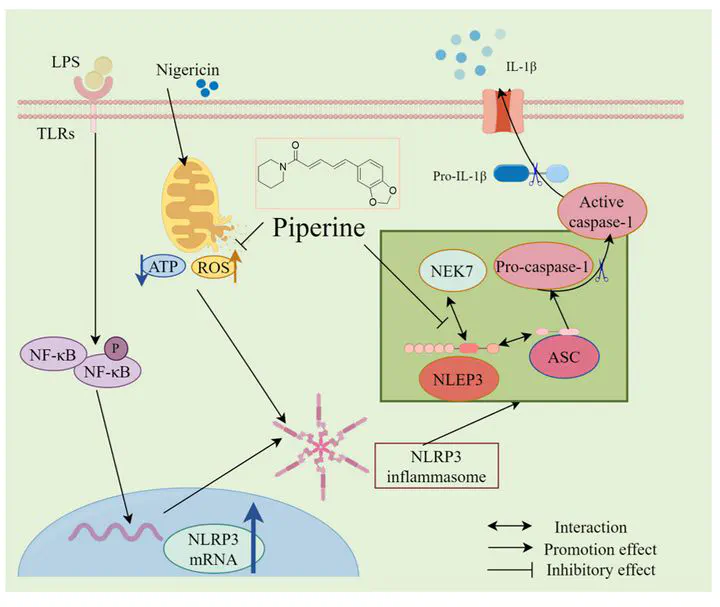Piperine targets the NACHT domain to disrupt NLRP3-NEK7interaction and alleviate inflammatory diseases
 Image credit: Unsplash
Image credit: UnsplashAbstract
Introduction: Excessive or aberrant activation of the NLRP3 inflammasome is implicated in the initiation and progression of various inflammatory diseases. However, to date no NLRP3 inflammasome inhibitors have been approved for clinical use. Objectives: This study aimed to investigate the molecular mechanisms by which piperine (PIP) regulated NLRP3 inflammasome activation and exerted anti-inflammatory effects in mice. Specifically, we examined whether PIP targets endogenous NLRP3 inflammasomes, its effect on the NLRP3–NEK7 interaction, and the key amino acid residues involved. In addition, the protective effects of PIP were evaluated in established mouse models of acute lung injury (ALI) and colitis. Methods: We identified NLRP3 as a potential target of PIP through COMET database and RNA sequencing. A classic NLRP3 inflammasome activation model was established in iBMDMs primed with lipopolysaccharide (LPS) and then activated with nigericin (Nig). Co-immunoprecipitation and molecular modelling techniques were used to examine the effect of PIP on the interaction between overexpressed NLRP3 and NEK7 proteins in vitro. Furthermore, two animal models were developed to investigate ALI induced by LPS and colitis induced by dextran sulfate sodium (DSS). Results: PIP specifically inhibited NLRP3 inflammasome activation without affecting NLRC4 or AIM2 inflammasome. Mechanically, PIP blocked NLRP3 protein oligomerization and ASC recruitment, and inhibited inflammasome assembly by interfering with NEK7-NLRP3 interaction. Molecular simulation confirmed that PIP binds noncovalently to NLRP3 at lysine 232 via a hydrogen bond, and mutating this residue to alanine eliminated its inhibitory effect on the NEK7-NLRP3 interaction. In vivo, PIP significantly alleviated LPS-induced ALI by reducing pulmonary edema and pro-inflammatory cytokines secretion. PIP also ameliorated DSS-induced colitis, accompanied by reduced NLRP3 expression in colonic tissue. Conclusion: These findings demonstrate that PIP exerted potent anti-inflammatory effects in vivo by specifically targeting the NLRP3 inflammasome, highlighting its potential as a therapeutic candidate for NLRP3-driven inflammatory diseases.
Type
Publication
Journal of Advanced Research
Click the Cite button above to demo the feature to enable visitors to import publication metadata into their reference management software.
Create your slides in Markdown - click the Slides button to check out the example.
Add the publication’s full text or supplementary notes here. You can use rich formatting such as including code, math, and images.